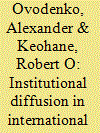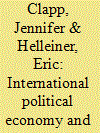|
|
|
Sort Order |
|
|
|
Items / Page
|
|
|
|
|
|
|
| Srl | Item |
| 1 |
ID:
128370


|
|
|
|
|
| Publication |
2014.
|
| Summary/Abstract |
International shipping transports around 90% of global commerce and is of major importance for the global economy. Whilst it is the most efficient and environmentally friendly mode of transport, CO2 emissions from shipping activities still account for an estimated 3% of global emissions. One means of significantly reducing fuel consumption and thereby GHG emissions from shipping are wind propulsion technologies (i.e. towing kites, Flettner rotors and sails) - yet current market uptake is very low. Therefore, the aim of this article is to identify the barriers and drivers for the uptake of wind propulsion technologies. To this end, the theoretical approach of technological innovation systems is adopted. This approach combines structural system components with so-called system functions which represent the dynamics underlying structural changes in the system. The fulfillment of these functions is considered important for the development and diffusion of innovations. Based on newspaper and academic articles, online expert interviews and semi-structured interviews, the level of function fulfillment is evaluated, followed by the identification of structural drivers and barriers influencing function fulfillment. Third, the possibilities to influence these drivers and barriers are discussed.
|
|
|
|
|
|
|
|
|
|
|
|
|
|
|
|
| 2 |
ID:
112806


|
|
|
|
|
| Publication |
2012.
|
| Summary/Abstract |
Standard works on international environmental governance assume single-issue regimes with binding obligations designed to govern the behaviour of states. Yet many of the most pressing global environmental problems, including climate change, forest degradation and biodiversity loss, are governed by an array of mechanisms-legal, non-legal, governmental and non-governmental-in complex arrangements. Examining the combined effects of these international and transnational efforts on domestic or firm policies and practices-the usual targets of such efforts-requires expanding a focus on regime 'compliance' and 'effectiveness' to 'influence' factors from beyond state borders. To facilitate such a move, the authors develop a framework that distinguishes four distinct pathways through which actors and institutions influence domestic policies: international rules; international norms and discourse; creation of, or interventions in, markets; and direct access to domestic policy processes. Propositions are then developed on the conditions under which, and processes through which, actors and institutions affect domestic and firm policies and practices along each pathway. The framework is applied to the case of forest governance, a prototypical example of complex global environmental governance.
|
|
|
|
|
|
|
|
|
|
|
|
|
|
|
|
| 3 |
ID:
112803


|
|
|
|
|
| Publication |
2012.
|
| Summary/Abstract |
This article explores institutional diffusion in international environmental governance, specifying the conditions under which an existing set of institutions provides a template for new institutions. Prior institutional experiences can help to resolve bargaining problems, reduce transaction costs and provide information about likely performance. The authors discuss five examples of institutional diffusion in international environmental affairs and outline some causal mechanisms and conditions that facilitate or block the diffusion of institutional characteristics. As a baseline analysis, founded on assumptions that abstract from politics, a functional argument is developed about the conditions under which mimetic diffusion, reflecting a pattern of imitation, can occur. Although the focus in this short article is on this functional argument, the authors recognize that state interests and power, ideology, and private interests also play significant roles in facilitating or inhibiting institutional diffusion in international environmental affairs.
|
|
|
|
|
|
|
|
|
|
|
|
|
|
|
|
| 4 |
ID:
112801


|
|
|
|
|
| Publication |
2012.
|
| Summary/Abstract |
For the past two decades, scholars of international political economy and the environment (IPEE) have become quite focused on the study of various international cooperative initiatives that seek to link economic and environmental issues in the wake of the 1987 Brundtland Report and the 1992 Rio Earth Summit. This important work has enhanced our understanding of topics such as the economic dimensions of international environmental governance, the environmental activities of international economic institutions and regimes, and new kinds of private international regimes governing the environment-economy interface. This focus of IPEE scholarship has, however, steered attention away from larger structural trends in the international political economy, whose environmental implications are not addressed explicitly by significant international governance arrangements. Three such trends that are deserving of more attention from IPEE scholars include: the globalization of financial markets; the rise of newly powerful states such as China and India in the global economy; and the recent emergence of high and volatile commodity prices. Each of these structural trends-as well as their interrelationships-have important environmental consequences whose closer study enhances our understanding of the relationship between the international political economy and the environment. Their study also encourages scholars to widen their focus beyond treaties, institutions and regimes to examine broader global economic structures and processes, and the power relationships within them, in an interdisciplinary manner that can draw inspiration from the pioneers of the field of international political economy from the 1970s.
|
|
|
|
|
|
|
|
|
|
|
|
|
|
|
|
|
|
|
|
|